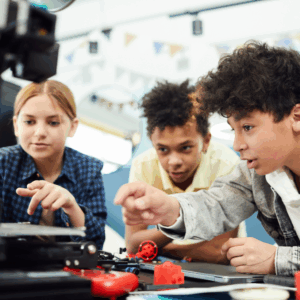Education has traditionally been centered on academic performance: grades, test scores, and curriculum mastery. However, research consistently shows that success in school and beyond is not solely determined by intellect but also by emotional intelligence (EQ). A student’s ability to manage emotions, build relationships, and navigate challenges plays a critical role in their overall learning experience. Schools that integrate emotional intelligence into their approach to education create happier, more engaged, and ultimately more successful students.
Emotional Intelligence: The Missing Link in Education
Emotional intelligence is the ability to understand, manage, and express emotions effectively while also recognizing and responding to the emotions of others. This skillset is essential for communication, problem-solving, and resilience which are qualities that directly impact a student’s ability to learn.

The Connection Between Happiness and Academic Success
Happiness and academic success are deeply connected. When students feel emotionally supported, they are more likely to stay engaged, take intellectual risks, and develop a love for learning. Conversely, stress and anxiety can hinder cognitive function, making it difficult to retain information or perform well in school.
Technology-driven programs like PASS, Bounce Together, and Amazing People Schools provide educators with tools to measure and enhance student wellbeing.

Integrating Emotional Intelligence into the Classroom
Modern education is evolving to recognize the importance of Social-Emotional Learning (SEL): a structured approach to teaching emotional intelligence. Digital platforms are playing a crucial role in making SEL more accessible and measurable. Here’s how:
- Interactive Learning: Tools like Amazing People Schools use storytelling to teach empathy, perseverance, and emotional awareness.
- Data-Driven Insights: Platforms such as PASS and Bounce Together help schools assess students’ emotional wellbeing, allowing educators to intervene early when needed.
- Collaborative Learning Environments: Digital resources encourage teamwork and communication, fostering strong interpersonal skills among students.

Preparing Students for Life Beyond the Classroom
Emotional intelligence isn’t just essential for academic success, it’s a lifelong skill that impacts personal and professional success. The ability to manage emotions, work in teams, and adapt to new challenges is crucial in today’s fast-changing world. Schools that prioritize emotional wellbeing alongside academic achievement set their students up for success in both education and life.
At Obelus, we believe that a truly effective education is one that nurtures the whole student, intellectually, socially, and emotionally. By embracing emotional intelligence, schools can cultivate happier, more resilient, and more successful students who are ready to thrive in any environment.



